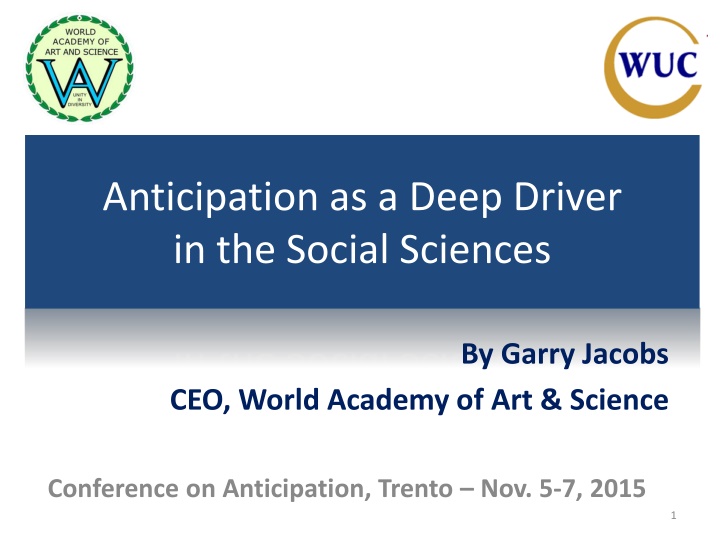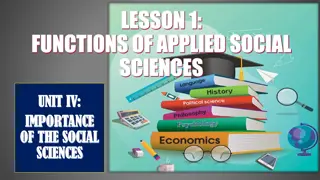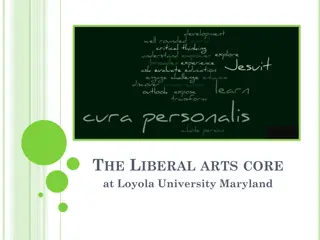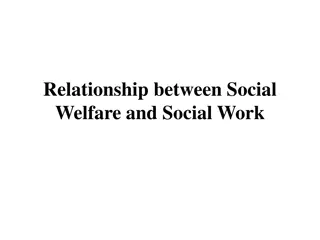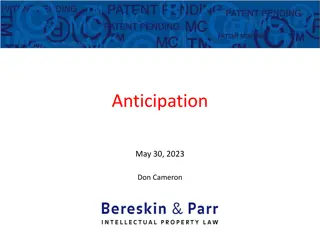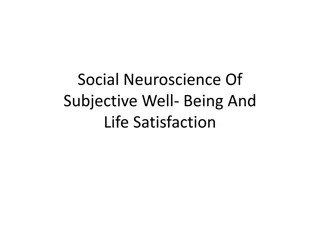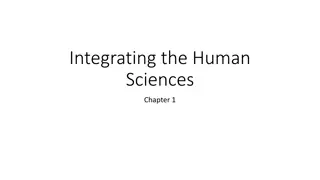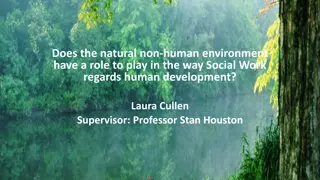Exploring The Relationship Between Natural and Social Sciences Through Anticipation
Explore the distinct characteristics that define the natural and social sciences, delving into how anticipation serves as a deep driver in the social sciences. Uncover the fundamental principles of human behavior, the role of consciousness and subjective reality in social science, and the influence of individual perceptions on collective outcomes. Dive into unanswered questions surrounding the nature of relationships between the social sciences, the place of the individual in society, and the concept of causality. Discover how ideas, beliefs, values, and anticipation play pivotal roles in shaping the future.
Download Presentation

Please find below an Image/Link to download the presentation.
The content on the website is provided AS IS for your information and personal use only. It may not be sold, licensed, or shared on other websites without obtaining consent from the author.If you encounter any issues during the download, it is possible that the publisher has removed the file from their server.
You are allowed to download the files provided on this website for personal or commercial use, subject to the condition that they are used lawfully. All files are the property of their respective owners.
The content on the website is provided AS IS for your information and personal use only. It may not be sold, licensed, or shared on other websites without obtaining consent from the author.
E N D
Presentation Transcript
Anticipation as a Deep Driver in the Social Sciences By Garry Jacobs CEO, World Academy of Art & Science Conference on Anticipation, Trento Nov. 5-7, 2015 1
Characteristics of the Natural Sciences Mechanistic subject to immutable, laws of Nature Complexity can be rendered mathematically Disciplines are interdependent and integrated A hierarchy of shared premises and fundamental principles Interdisciplinarity and trans-disciplinarity are inherent Objective concept of reality ignores the subjective dimension Study of the collective ignores individual differences Deterministic concept of causality based on past events and present circumstances 2
Characteristics of the Social Sciences Influences by phenomenal success of the natural sciences Laws are human-made and subject to change Complexity is too great to be rendered mathematically Disciplines are fragmented, autonomous, almost unrelated Subjective view of reality cannot be minimized Consciousness is the creator not mechanical Nature Unique individual can alter the entire collective Perceptions of the future have immense impact on outcomes. 3
Unanswered Questions What is the common basis and nature of the relationship between the social sciences? What is the proper place of the individual in a science of society? What are the fundamental principles common to all forms and fields of human behavior? What is the legitimate place of the subjective experience of reality in social science? What is the role of consciousness, aspirations, ideas, values, attitudes and choice? What is the nature of causality in the social sciences? 4
Fundamental principles of social sciences Ideas, Beliefs, Values Organization Skill Social energy Social power Anticipation 5
Future is an attractor Ideas Aspirations Expectations Imagination Fears Values 6
Values as Deep Drivers Values are aspirations for perfection History follows the evolutionary line of emerging social values 7
Past vs. Future Extrapolation from the past fails when the principle determinates are attractors from the future toward which individuals and society are moving with anticipation 8
Individual Microcosm of the collective Complex, conscious organism Conscious representative of the collective Pioneer and catalyst for social evolution Occupies a unique position in society as both determinate and determination Cannot be reduced to that of a mere statistic. The creative source of values, ideas, aspirations One individual has the power to change the world. 9
Society The social macrocosm Multidimensional network of relationships Complex, conscious living organism More than the sum of its parts (people) Has its own subconscious will and aspirations Individual and Collective are complementary and inseparable components of the social whole 10
Conclusions Mechanistic, reductionist, materialistic, compartmentalized social theory is inadequate to deal with the multi- dimensional complexity of social events and outcomes. Social science needs to unpack the significant characteristics that differentiate physical, biological and social systems. An effective science of society would necessarily have to transcend disciplinary boundaries to identify principles & processes fundamental to all fields and forms of social activity, change, development and evolution. Consciousness and choice are primary determinates of future outcomes. Among them, perception of the present and anticipation of the future are powerful drivers. 11
